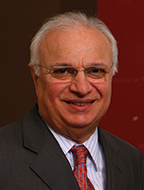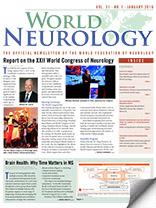By Raad Shakir
Since Don took over as editor of World Neurology (WN) in April 2013, we have seen a steady improvement in the quality of our newsletter with the publication of each of the 16 issues he has overseen. In his first editorial, he stated that the new electronic format would permit ready coordination among the two WFN publications, the Journal of Neurosurgery and WN, and the WFN website.
Part of the challenge, he said, would be to avoid all but essential redundancy among the three, and that has clearly been achieved through the World Neurology Editorial Advisory Board, which was created, and in other ways. In fact, so successful has this been that we have been able, during his editorship of World Neurology, to launch a third publication — the new open access journal, eNeurologicalSci (eNS), a sister journal to WFN’s longtime flagship scientific journal, the Journal of the Neurological Sciences (JNS). No doubt, we shall begin to seamlessly blend this too into the system, as it develops and grows as part of the WFN’s publications portfolio.
Don set out his plans to publish important news from the WFN, reports of WFN activities in the field and reports from the WFN’s committees and officers, but beyond this, he also targeted abstracts of articles that seemed to be the most important to global neurology. All of this has been an unqualified success, for which the trustees and I, and indeed the WFN as a whole, are most grateful.
World Neurology is now on sound footing for his successor to take it forward to the next stage. There is still much work to be done in developing the email database, as we all know, and we have begun to address that issue as well. Don will be succeeded by Prof. Steven Lewis of Chicago, Illinois, USA, as editor and Walter Struhal of Innsbruck, Austria, as co-editor.
I simply wish to express our collective gratitude for the contribution Don Silberberg has made and to thank him for his continuing efforts on behalf of the WFN. I hope the experience has been an enjoyable one and that Don has found the organization to have a useful role to play in neurology.

